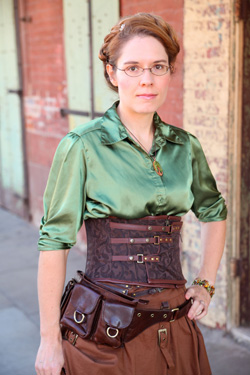














Cold blanches the world and gnaws color from the sky. The boy stands on the hill, a lone blot of black against the blinding white. Snow is soundless as he pats firm the chest of his snow-soldier and forces stick arms into place. The half-made figure looms bold and strong, like his mother. Every so often, the boy glances south to follow the soldier’s icy gaze, but only briefly.
Hurry, hurry. He can hear the echoes of Mother’s voice, even days later. The gwella, they come, their pelts thick and maws wide.
His hands, despite numbness, do not falter in their practice. Mother taught him well, and she said the body must always be made first, for even when a baby is made in the womb, that is how it grows. A snow-soldier’s torso may be solid with snow, but therein rests the spirit of lungs and heart; that is where the breath begins and ends.
Along the spiny ridge softened by lush white, dozens more soldiers stand silent at their sentry posts. Specks of snow glint from the divots of their dark granite eyes.
The boy finishes the arms and then kneels to shape the legs and feet. Exhaustion roots him to the ground. He could rest, maybe, for a while. As long as Mother lives, no danger will near the village.
And yet—she assigned him this hill, this important hill. The whole village depends on him. Groaning, the boy forces his legs to work. He staggers to grab a pitchfork from a sparse pile of implements, and stabs it tines-first into the ground before the snow-soldier.
Behind the ridge, a baby wails, the sound cutting through air thickened by a brittle wind. A trace of smoke laps the sky and blends with the terrible grayness. The village is far too quiet, with so many gone. Only the elderly and the babies remain.
A different wail slices the air. He spins on his heel, facing southeast to the road below. He aches to hear two more blasts of a horn and to see Mother leading the others home, triumphant and safe.
Below, like shadowed lumps against white, he can barely see more snow-soldiers and the moving blur of the girl with a horn to her lips. Just a few years his elder, her hair is coiled high to signify new womanhood.
Beyond her, still distant, are traces of grey against the plain, as if pieces of the dismal sky have dropped to earth. Not horses. New coldness shivers through him. The monotony of labor drove fears from his mind, but now he remembers why he is here, why the village smothers in stillness, why his mother and the others galloped away three days past, why he and the other children have labored these long hours.
If the gwella are here, then Mother—
The boy will not think on that, there is not time. He blinks away the tears that frost his eyelashes and presses gloved hands to his lips. He inhales the fierce air, lets it swirl and stew in his lungs for a long and burning moment, and breathes out life in a lingering note of song. His voice drifts, still soft with masculine youth, and is so tender and vibrant it so-slightly melts the whitened ground.
His soldiers rise and step forward with a synchronized crunch of snow-made feet on kindred snow. They grip scythes and shovels within twigged fingers.
Mother surely raised a hundred such soldiers in her stand with the other villages united at the pass.
The boy points to the galloping gwella. The soldiers’ gazes follow. With his every breath, his golems breathe, and with his thoughts, they think, and with his love, they love—mother, grandmother, sister, village.
The boy retreats behind his ranks. From the road below, he can hear the din of battle, feral howls and the ring of metal. He cannot see them within the dip of the land, and then the gwella are here, golden-eyed and red-toothed, snouts raised at the prospect of meat.
He holds his dagger at ready, but his soldiers bear the brunt. Branches snap and ice crunches, but he pounded the snow-flesh well. His soldiers move with the grace of the winter wind; snow knows no pain. Violence blurs, then—near silence. His ragged breaths cloud the air; the soldiers shift and creak.
Three horn blasts waver from behind him. The sound echoes from other points around the village as each child calls in. He fumbles his horn out from beneath his coat and wavers his all-clear. The battle is done, so quickly.
No sound rises from the road below. The gwella leave no survivors; they leave nothing, in their hunger.
He slogs forward on quivering legs. He counts ten slain gwella—each big as a moose, their ribs visible through grey shag. The messengers from the south had reported a pack of hundreds. This—this—was all that got through. It stopped with him.
That meant Mother did well.
Tears trace icy trails down his cheeks. He salutes his soldiers. Those intact salute in turn. They remain vigilant, granite gazes steady.
Again he hears the keening of his baby sister in the village. He trudges home. The wind shifts, bringing the welcome scents of smoke and soup, but the silence and cold bite even fiercer than before.

Beth Cato’s debut steampunk novel, THE CLOCKWORK DAGGER will be released by HarperCollins Voyager in September 2014. She’s originally from Hanford, California, but now resides in Arizona with her husband and son. Her short fiction, poetry, and tasty cookie recipes can be found at http://www.bethcato.com.
Read more stories by Beth Cato

